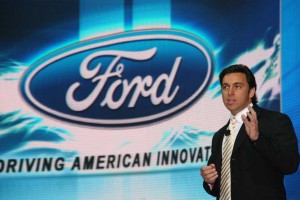
Mark Fields: Sees positive side
Though it has chosen to rely on its own resources, rather than seek a federal bailout, officials at Ford Motor Co. have been keeping a close eye on the progress its two cross-town rivals are making in their bid for further government support.
And while it’s too early to tell whether Washington will approve the viability plans submitted by General Motors Corp. and Chrysler, on Tuesday, Ford’s President of the Americas, Mark Fields, told TheDetroitBureau.com, in an exclusive interview, that he sees signs that “bode well” for Ford’s domestic rivals.
One of the most critical signals came from President Obama himself, said Fields, noting the Commander-in-Chief’s recent reference to the auto industry as “one of the pillars of the economy.”
“For the sake of the industry, it’s very positive that the administration views the auto industry as (being so) vital,” Fields said.
The viability plans submitted by GM and Chrysler request billions more than the two automakers were originally granted, last December, by the Bush White House. The two automakers will close more plants, eliminate still more jobs and, in the case of GM, seek additional assistance from the Canadian and European governments. Nonetheless, General Motors CEO Rick Wagoner pointed out that his company directly or indirectly employs 1.3 million people – a number not likely to be lost on a president who is desperately seeking to reverse the current economic slide and create millions of new jobs.
A final plan will need be submitted by Chrysler and GM by March 31st, at which point a final decision will have to be rendered on the automakers’ requests. Though the president will likely have the final say, the bailout will be managed by a new, three-member board led by Treasury Secretary Timothy Geithner. Until recently, it had been expected that Pres. Obama would name a single “car czar.”
For his part, Fields said that change in strategy is a good one. “Having a committee instead of a car czar will allow GM and Chrysler to educate more government officials to the state of the industry and the importance of the industry.”

Ford’s situation is better, I agree, but it’s not a mountain of cash, by any means, and CEO Mulally made a carefully crafted comment, this month, that suggested there might be a situation arising that would, indeed, force Ford to seek federal assistance. The proverbial: stay tuned.
Paul A. Eisenstein
Bureau Chief, TheDetroitBureau.com
One reason that Ford is in a relatively better position than GM or Chrysler is that their overseas divisions are competitive in those markets. Ford can relatively easily bring some of the small fuel efficient vehicles they sell in Europe and Asia to the U.S. Stupidly, they’ve skipped two newer generations of the Focus that they could have been selling here. Ditto with cargo vans. Mazda has also been a good source of design for them. They sold a bunch of second generation Escorts based on the Mazda 323. Those were good cars. I know, I had two. If they were smart, they’d hang on to and invest more in Mazda instead of letting it go. Mazda makes some pretty good cars.
Chrysler, as I understand it, has essentially no overseas divisions anymore. Personally, I think Chrysler’s only asset that has any value at this point is the Jeep brand name. History repeats itself, I suppose. Jeep was the only thing AMC had going for it at the end too.
GM has Holden in Australia to source the Malibu and others from and Opel in Europe. The more recent Saturn badged Opels haven’t done too well here. Saab is bankrupt. What else have they got?
Bryan,
Your comments are spot-on. Let me address the latter point, first. Saturn, in particular, is a peculiar story, as GM long starved it of product and effectively made the brand irrelevant, here in the U.S. By the time the Opel-derived products arrived, most customers simply didn’t care, and marketing didn’t have the necessary zing to get folks to look. It didn’t help to have a relatively expensive Astra (v the entry car it replaced) brought in from Europe, at current exchange rates. Saturn SHOULD be doing well, and it says a lot about GM, as a whole, that it isn’t.
As to the Holden-derived Pontiacs, well, there’s a reason that U.S. brand is effectively going away, what with the GM reorg. I doubt anything would work for it, right now.
Ford’s European products are significant, right now. I drove the Fiesta, a few months back, and if it were already here, it’d be my absolute number one pick in the segment. Sadly, it’ll be mid-cycle when it arrives, but still very competitive. Same story with Focus. Bad decisions by old management. But good news, I’m betting, going forward.
It’ll be interesting, meanwhile, to see what the down-revised relationship with Mazda yields, now that Ford no longer controls the Japanese maker.
It’s ironic, isn’t it, that if former CEO Alex Trotman hadn’t so butchered the Ford2000 program, things now might’ve been hugely different?
Finally, Chrysler: I’d like to think the minivans still have some value, but the latest redesigns seemed determined to destroy what Lee Iacocca long called the company’s “crown jewels.” So, Jeeps are about it.
Enjoying your comments.
Paul A. Eisenstein
Bureau Chief, TheDetroitBureau.com